“I’ve missed more than 9000 shots in my career. I’ve lost almost 300 games. 26 times, I’ve been trusted to take the game winning shot and missed. I’ve failed over and over and over again in my life. And that is why I succeed.”
-Michael Jordan
Fear-based thinking is a part of human nature. It helped our species survive and strive over the years. In most parts of the world though, a mistake will not lead to death or any permanent damage anymore. Still, we are extremely scared of making mistakes.
For a long time, this fear drove me crazy while playing chess competitively. I even went as far as to cheat in training. After years of working on it, with the help of a sport-psychologist, I am ready to share my antidote to it.
But before giving the solution, I will take you through my pain and all the things that went wrong because of fear-based thinking.
Origin Of Fear-Based Thinking
As Jim Afremow explains in his great book, The Champion’s Mind: How Great Athletes Think, Train, and Thrive, fear is the main reason people start to play to avoid losing, “Playing as not to lose is rooted in fear.” From our early childhood, we get programmed to avoid making mistakes.
I can vividly remember different scenes in school when other kids laughed at me for saying something wrong. The easy solution out is: never say anything in front of your classmates again. Instead of encouraging kids to learn and be ready to commit mistakes, society teaches them to shut up and avoid standing out.
Fearing Mistakes In Training
Since my school days, I struggle to embrace mistakes. Terrified to be laughed at again, I usually remain very quiet in group training unless I am 100% certain about my answer. Instead of testing what I see, I will rethink everything 5 times in order to be sure I don’t say anything wrong.
“What if I miss something trivial”, and “What would the coach and other players think of me?” are only some questions that pop up in my mind.
This fear of making mistakes drove me as far as to cheat in training. In my early teenage years, I started comparing my thoughts with the Engine suggestion before telling the Coach.
It seemed like the most efficient way to ensure not making mistakes anymore. And thus, avoid the pain of being wrong. Because I was so ashamed of it, I actually never told anybody about it. As I recently saw the following tweet, I felt it is the right time to talk about it.
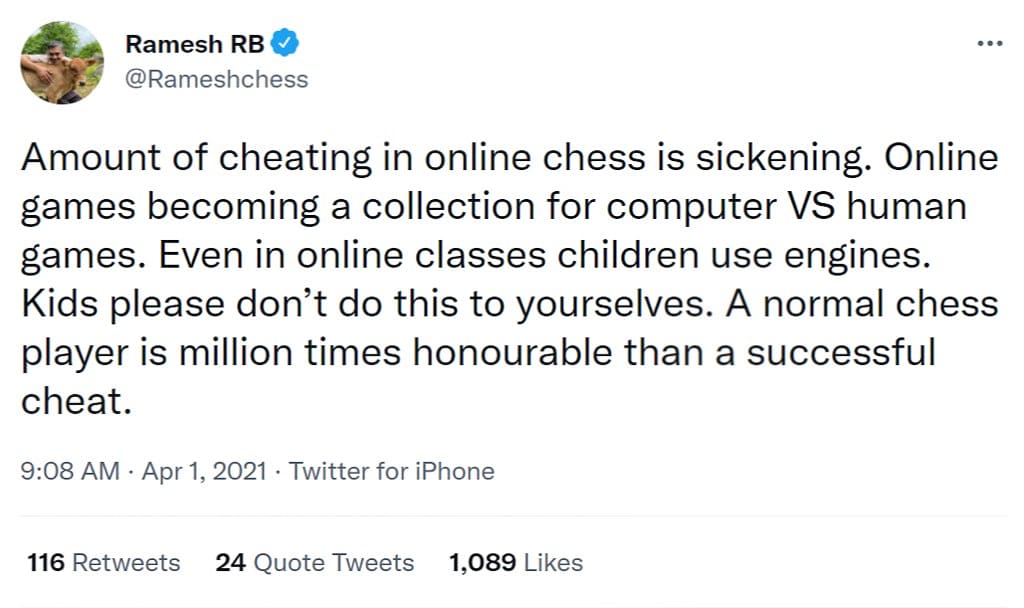
It is needless to say that I never did anything like that in any competition. I understood very well that by cheating in competitions you hurt other people, directly and indirectly. This is a much more serious problem, one that needs to be punished severely!
Also, do I not want to harmonize cheating in training. If you cheat in training, you hurt yourself and the trust of your Coach. But, I also know that I am not the only one that did such a thing. And I know this behavior is always rooted in the fear of being wrong. So, it is not enough to point the finger and say: don’t do that.
We as a society need to encourage mistakes, and not shame anybody for being wrong!
The cheating not only undermined my self-confidence but also considerably slowed down the process of improvement. The fastest way to learn is to test your thoughts and learn from your mistakes. Avoiding them altogether does NOT help you at all!
Fearing Mistakes In Competition
I struggled with fear-based thinking a lot. Only when playing higher-rated opponents could I enjoy the game without stressing about messing up. Read this article for my approach.
In tournament games, the fear of mistakes is even more prominent. There are so many reasons to be afraid: you can be afraid to lose your rating, embarrass yourself against a weaker opponent, mess up your great tournament situation, or miss the chance to get your ultimate Norm for a Title.
Whenever you play not to lose, you will be passive and not trust yourself. After 8 amazing rounds, you finally have the chance to play for a Norm. Suddenly everything changes. While in the 8 previous rounds, you enjoyed yourself and played to win, suddenly you have something to lose.
“If I mess up now, the 8 great rounds were senseless” might be just one way of getting in the wrong Mindset.
It already starts in preparation. Instead of trusting your openings, you will see dangers everywhere. Even if you just outplayed some amazing opponents in complicated positions, you will tend to avoid those exact same positions now. “What if I go wrong”. “Better play safe”.
During the game, it does not get better. Even if you see a great continuation, you might think “but what if I miss some tactics?”. It might get worse if you have already experienced “messing up” in a similar situation. Instead of thinking: “what is my best move”, you will think only about not messing up.
It is crucial to understand the following: the fear-based approach is always linked to some “final” result. No matter if achieving a Norm, losing to your biggest nemesis, or achieving the highest-ever rating: these circumstances seem so strong that they make everything else seem unimportant.
The 8 great games do not have any value if you do not achieve the Norm with the ninth. This is because you overvalue one single result and undervalue your progress. Let’s look at some of my examples, where the fear of making a mistake cost me dearly in considerably easy positions.
Please Learn From My Mistakes
Even though I improved a lot over the past years, I still fear mistakes in Competitions now and then. Usually, this comes up in two opposite cases: either I am playing very well and the following game is crucial for tournament victory, or I am playing badly and my confidence is very low.
In the following game, I played a very nice combination leading to this easily winning position:
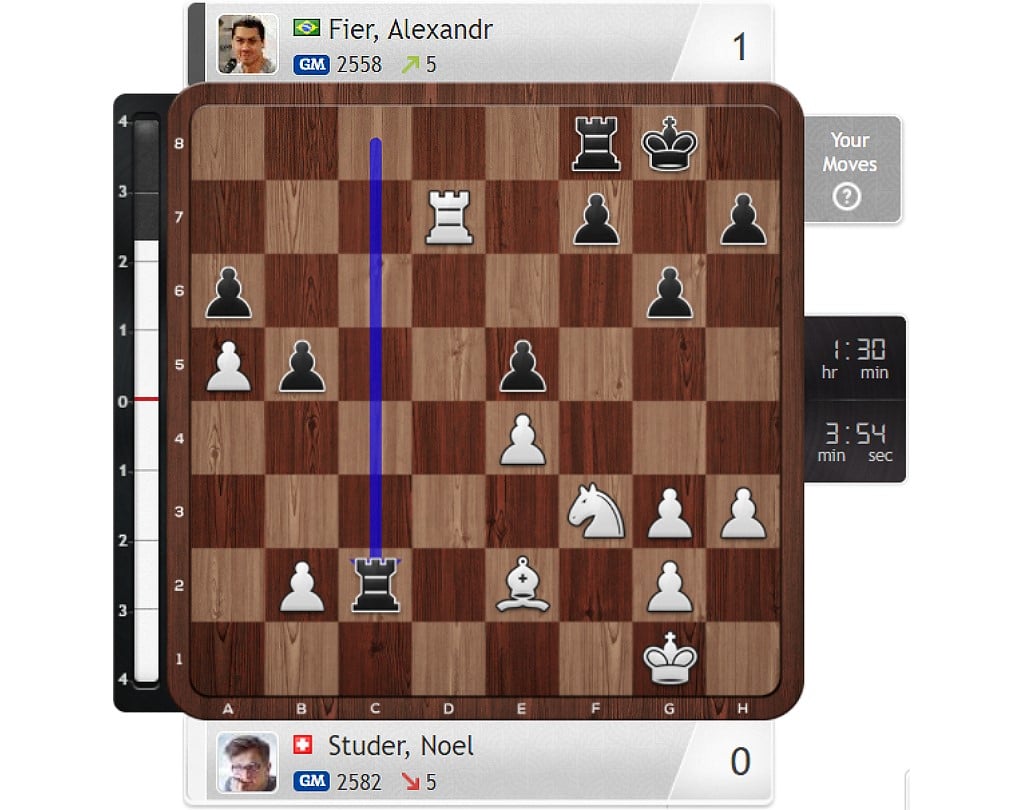
The two pieces are much stronger than the blacks rook. My intuition screamed 29.Bd3 Rxb2 30.Nxe5. In any Bullet game, I would have gone for that line, which is easily winning. But as I didn’t play well the days before, I started fearing an oversight.
I started to tell myself that it could be dangerous if the f8 rook enters c1 and after Kh2 the other Rook comes to a1 and then Rh1 is mate. Or that after doubling the rooks on the second rank g2 is falling with a check.
Additionally, I started to worry about the “loose” Bishop on d3.
Basically, I was imagining ways of messing up and losing the game.
But there is no way any of this can happen! My bishop on d3 is protected by the rook and knight. And his f8 rook cannot even move once because f7 is hanging! After 9 Minutes of fear-based thinking, I came to the conclusion that 29.Bf1? is safest. After Rxb2 30.Rd6?! (30.Nxe5 is again “not safe”) f5! black started to take over. Not surprisingly did I really end up losing that game.
My Last GM Norm
The GM Title is a dream for many chess Players. In 2017 I finally had the chance to get it. After I missed my third norm a number of times, I was playing at the top of my capabilities in the Grenke Chess Open 2017.
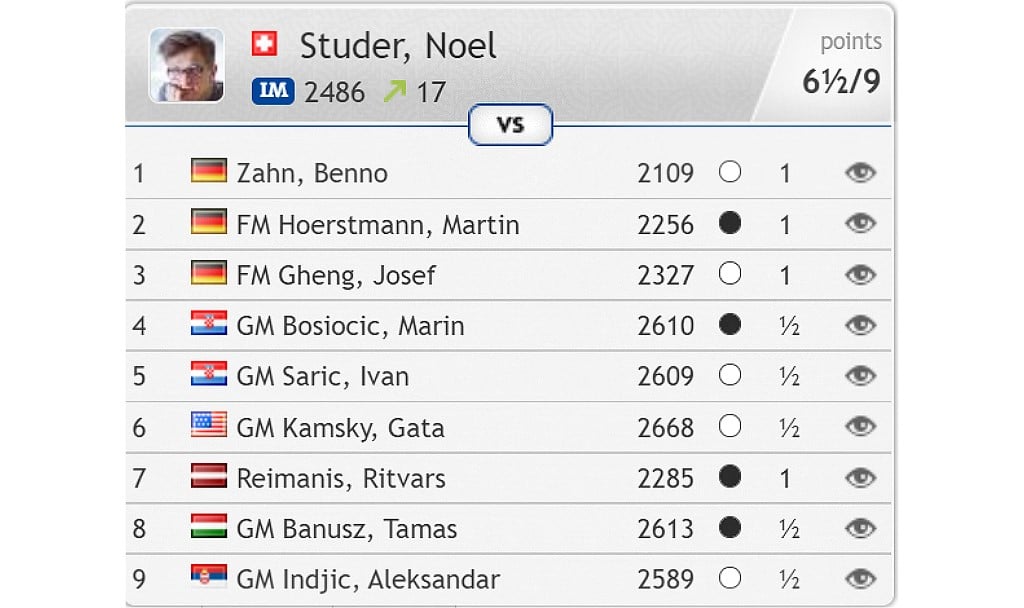
Still unbeaten, I was only a draw away from the GM title. In the 4 draws against Top GMs with a rating over 2600, I was always on the pushing side. Actually, I should have converted at least one of the games. So, a draw with white against a GM with slightly under 2600 should have been a pretty easy task in such a form.
But suddenly, I had something to lose. “What if I mess up again as I did in the Summer of 2016 when I lost with white in Round 8 and missed the Norm by half a point?” “Will I ever be in such a form again?”
The game was an absolute rollercoaster. Instead of trusting myself, I reconsidered every decision, just to make sure not to blunder anything. For moves 7 and 8 I already spent 30 minutes combined. On move 14 the following happened:

After 38 Minutes(!) of thinking how much it would suck to mess my GM title up and lose this game, I decided to go for 14.Nxc6? Because of the isolated pawn on d5, any sensible move like Bc3, Nac2, Rac1, and Rfc1 would give me a slight edge without much risk.
In such a situation one usually cannot stand tension (like Nc6 against Nd4) and wants to resolve it as quickly as possible. That is my only possible explanation for my horrible move here.
I was shaking and with every move, my position got worse. Now, I started kicking myself for playing so bad, telling myself I’m an idiot and that I will never get that GM title. Then there was a turning point. It was around the following position when I was so negative that I was absolutely certain I will lose.
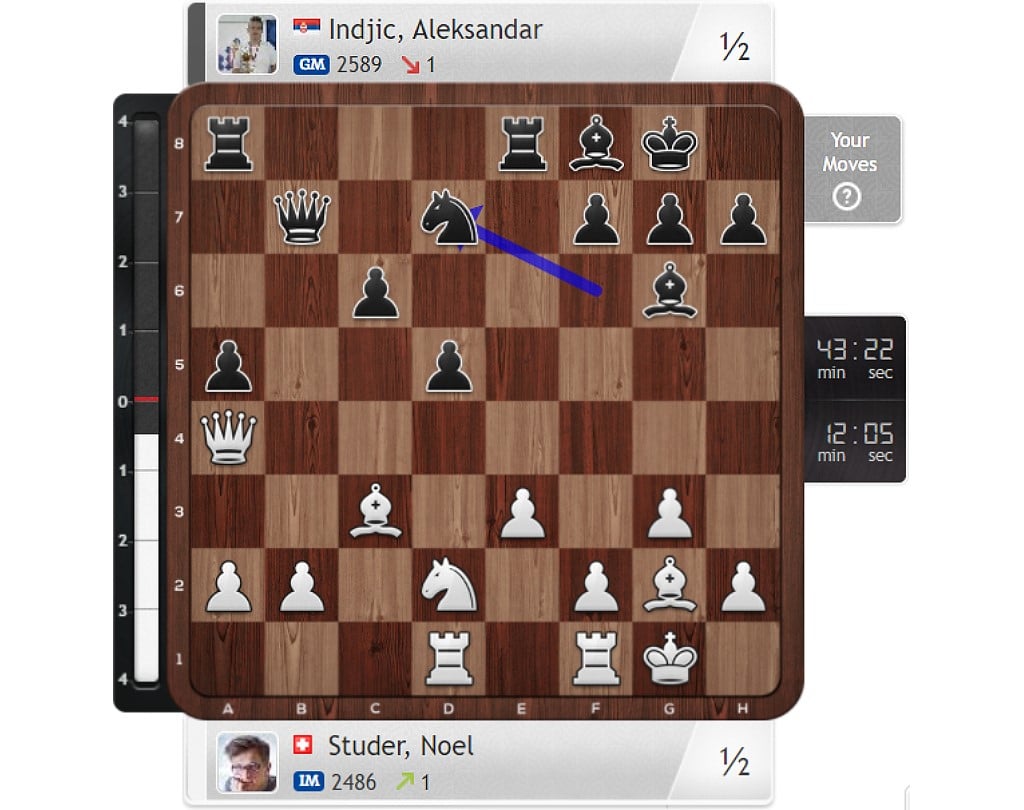
Yes, I am worse but by no means close to losing. It was as if I already felt the disappointment of losing. I felt freer now, and I decided at least I want to go down fighting.
Thus, I sacrificed a pawn after only 3 Minutes with 23.Nb3 Bc2 24.Rd2 Bxb3 25.axb3 Nc5 26.Qg4. I started playing actively as I did before in the tournament. Influenced by my newly won confidence, my opponent went wrong soon after.
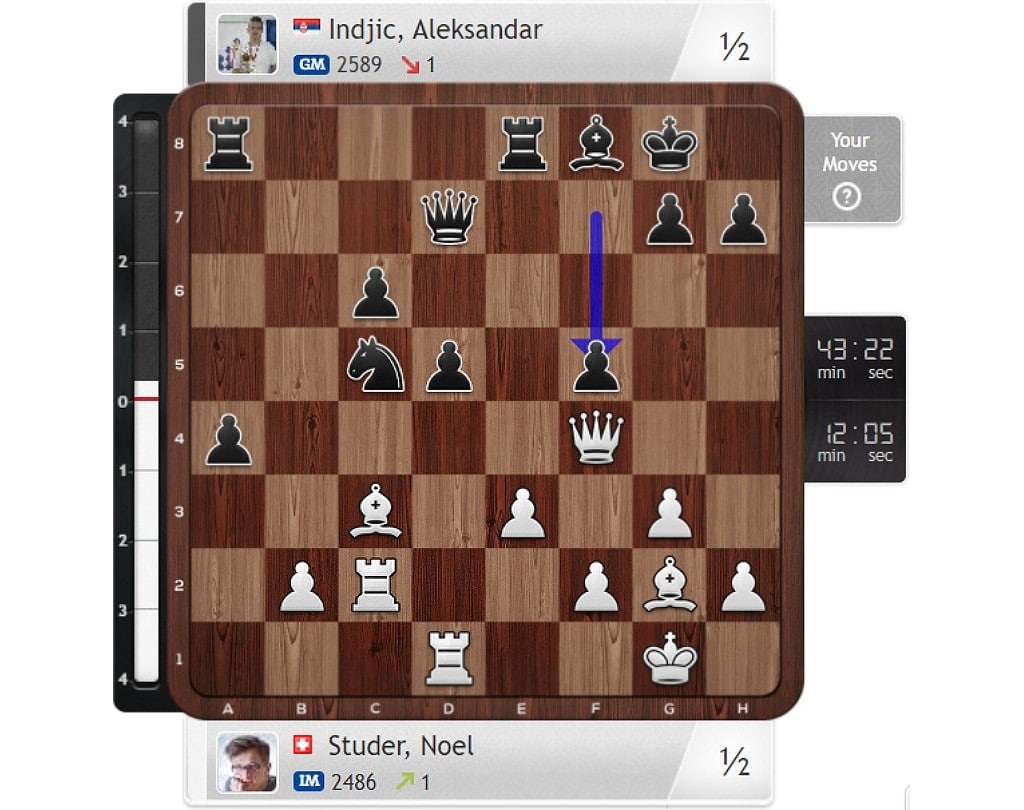
30…f5? was a big mistake. After 31.Bh3! (he missed that) g6?! 32.Qd4! Ne6 33.Qh8+ Kf7 I could choose between perpetual check with 34.Qf6+ Kg8 35.Qf6+ or playing on with 34.Qxh7+. Not able to think clearly, I immediately opted for a draw by repetition. I could not wait to let this game behind me and finally clinch the GM title.
The win was not too hard to spot. After 34.Qxh7+ Bg7 35.e4 (the only tough move) Rh8 36.exf5 Rxh7 37.fxe6+ Qxe6 38.Bxe6+Kxe6 39.Bxg7 Rxg7 40.Rxc6+ I would soon pick up d5 as well, get another 30 Minutes, and a rook ending with two pawns up.
I am absolutely certain I would not have secured the draw without the mental switch in the middle of the game. This was by pure luck though, and I did not want to repeat such an experience again.
That is why I searched for an antidote to the fear of making mistakes.
Focus On The Process, There Is No Final Destination
The cure to the Problem is to see the path as a never-ending process. Yes I know, this sounds a bit woo-woo. But stay with me, this will make a lot of sense soon. If you see your chess path as a never-ending learning process, mistakes can actually be positive. Once you were in a tough situation you get experience and got stronger because of it.
Losing a must-win situation only makes you stronger. Next time you can profit from that experience. So there is nothing to be afraid of! That is why in Sports we say: “Either you win, or you learn”. From now on, my goals are just nice highlights on a never-ending way to improvement. Achieving a goal is not a final destination anymore, but just a nice passing point on my way.
No more “I have to win now or I will never get the chance again”. Instead, I can think “awesome to be able to play for that title. If I don’t get it today, I’ll learn what it takes for next time”. As there is no fixed destination, making a mistake is no problem anymore. In Training, I now try to be happy to be corrected by my co-students or coach. Why?
Because it is a chance to learn and get stronger. It is not about how strong I am in this moment, but how strong I can get in the future.
In order to get stronger you MUST make mistakes and correct them.
How boring would it be if I already knew everything! As nice and easy as it sounds, I have to warn you. This change does not come easy. In no way would I claim I completely made the transition. There are moments when you will feel as if this is your only chance. If you fail, it is all over. This is the chance you always waited for.
If you are able to remember yourself in such moments to focus on the process, that will help a lot. It also helps to lose some games and realize the world is still the same. It feels bad, but nothing really changed. Get up again, focus on your improvement, and an even better chance will come.
Change Your Approach Now
As said, this change will take some time. So start now!
- Share your knowledge publicly, and welcome feedback
- Focus on your moves, not the result
- Don’t be ashamed of your mistakes, embrace them instead!
- Strive for improvement, not titles
- Always trust your intuition during games
A great way to keep reminded of the right approach is following Indian Coach Ramesh RB on Twitter. He is a great inspiration to me. Additionally, I really liked the audiobook ‘The Courage to Be Disliked‘ by Ichiro Kishimi and Fumitake Koga.
I am looking forward to your comments. Please tell me what I can improve. I know I will make mistakes and am looking forward to improving. I really hope this article helps you change the way you think about mistakes. Because if it does, it can change your life.